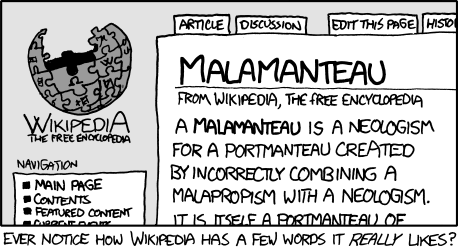Remember Bennifer? (And wonder why?)
Well, Bennifer — describing the then union between singer-actress Jennifer Lopez and actor Ben Affleck, and in effect creating a ‘composite identity’ of the two lovebirds — was one of the early examples of celebrity-name-meshing that’s now enjoying such a craze in Hollywood and beyond. (Other notable examples are Tomkat, Brangelina, and Billary. And this name-meshing can actually be traced back at least to the ’70s: there’s a scene in All the President’s Men in which the movie’s reporter-protagonists Woodward and Bernstein are referred to as “Woodstein”.)
Bennifer is a twist on the portmanteau: a linguistic blending of two or more words and their meanings into one new word with a composite definition. A good example of a portmanteau is brunch, which combines not just morphemes but also the meanings of its root words breakfast and lunch: ie. it describes a mid- to late-morning repast that combines in its menu typical fare of those respective meals. I have always thought that portmanteau was just a posh name for a suitcase (or a musical term — I guess that’s portamento), but my daughter’s boyfriend told me about its second and much more interesting definition during a discussion about acronyms (see previous post).
A marriage of French words meaning “carry” (porte) and “coat” (manteau), portmanteau had as its original and more prosaic definition a large traveling bag or suitcase, usually made of leather, that opens into two equal sections. The word was adopted by Lewis Carroll in the late 19th century to describe a new type of composite word that he invented especially for his poem Jabberwocky: slithy (combining “lithe and slimy”) and mimsy (“flimsy and miserable”) are two such words from his famous nonsense rhyme. Wikipedia describes how Carroll not only coined the new meaning for portmanteau but also explained his thinking in his most famous book and in another of his poems: “[In Through the Looking Glass] Humpty Dumpty explains the practice of combining words in various ways by telling Alice, ‘You see it’s like a portmanteau—there are two meanings packed up into one word.’ … In his introduction to The Hunting of the Snark, Carroll uses “portmanteau” when discussing lexical selection: ‘Humpty Dumpty’s theory, of two meanings packed into one word like a portmanteau, seems to me the right explanation for all. For instance, take the two words “fuming” and “furious”. Make up your mind that you will say both words, but leave it unsettled which you will say first … if you have the rarest of gifts, a perfectly balanced mind, you will say “frumious”.”
Examples of portmanteaus in common modern usage are smog (smoke + fog), infomercial (information + commercial), advertorial (advertisement + editorial), motel (motor + hotel), and simulcast (simultaneous + broadcast). Pakistan, as well as being an Urdu word, combines the names of its constituent regions: Punjab, Afghania, Kashmir, Sindh, and Balochistan. When the African countries Tanganyika and Zanzibar united in 1964, the resulting new republic was named Tanzania. Wikipedia is a portmanteau, melding the words “wiki” and “encyclopedia”.
Many portmanteaus (or portmanteaux, if we want to feel swanky and French) start off as neologisms; a neologism (from the Greek néo-, meaning “new”, and lógos, meaning “speech” or “word”) is a word or phrase that is (or has a new meaning) new to common and accepted usage. An example of a neologism/portmanteau is metrosexual (which combines “metropolitan” and “heterosexual”), an adjective cooked up in the 90s to refer to straight men who display stereotypically homosexual traits such as fashion-consciousness and the investment of time and energy in careful grooming and clothes-shopping. Another example of a relatively recent neologism — in which an old word has a new use — is “friend” used as a verb, as in “to friend someone on Facebook”.
A bit of light word association takes us via the neologism “Bushism” (describing an utterance of our linguistically accident-prone former president George W. Bush) to another type of word or expression founded on the use — or in this case the often unintentional misuse or mixing up — of other words and phrases: the malapropism. Probably the most famous Bushism-malapropism, which also seemed to be a portmanteau but will hopefully never be a neologism, is misunderestimate. This non-word, presumably meaning (if it were a real word) to severely underestimate, and an apparent concoction of misunderstand and underestimate, was used on no less than three occasions by President Bush…
And finally, please enjoy this cartoon published on the webcomic xkcd.com. Here, comedian and xkcd founder Randall Munroe illustrates in a brilliant parody — of linguists, Wikipedia, and anyone who writes or reads grammar blogs — how the online encyclopedia might present and define his own invented stunt word* malamanteau.
* a deliberately attention-seeking neologism


